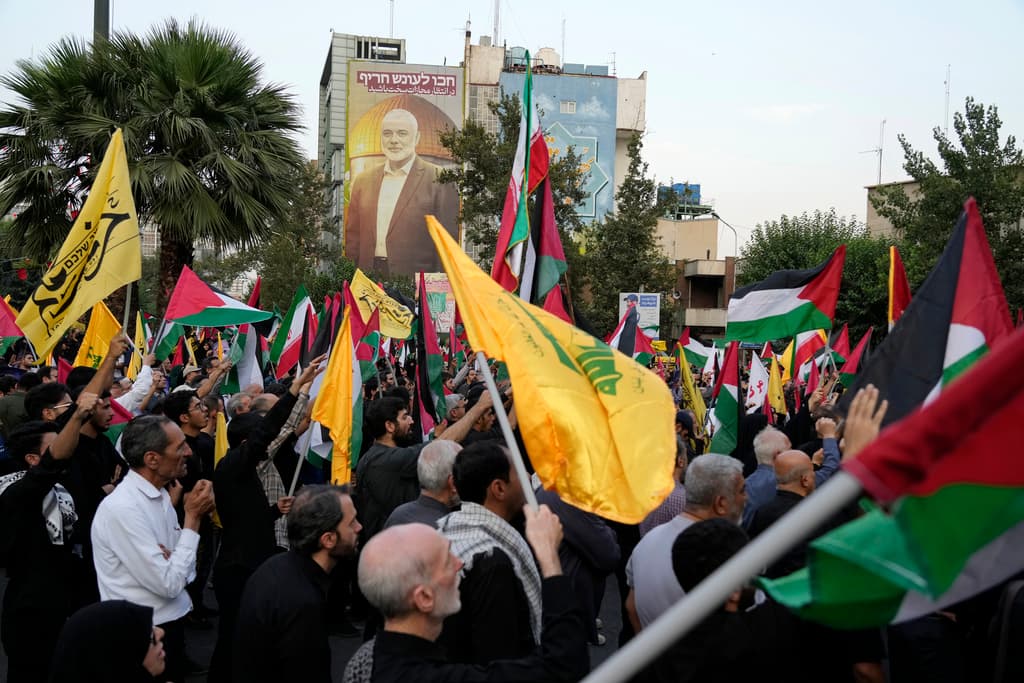As Israelis Brace for Possible Retaliation by Iran and Hezbollah, Washington Pushes a Return to Cease-Fire Talks
‘Following this bitter, tragic event which has taken place within the borders of the Islamic Republic, it is our duty to take revenge,’ the Islamic Republic’s supreme leader, Ali Khamanei, writes on his X account.

As America insists that the time is right for a return to diplomacy following the decapitation of top Hamas and Hezbollah leaders, Israel is preparing for possible attacks from Iran and its “ring of fire” proxies.
Hours after Israel announced the killing at Beirut of Hezbollah’s top military official, Fouad Shukr, Iranian state-owned media reported that Hamas’s political boss, Ismail Haniyeh, was killed at Tehran. While Israel is widely believed to be behind Haniyeh’s death, it is yet to take responsibility.
“Following this bitter, tragic event which has taken place within the borders of the Islamic Republic, it is our duty to take revenge,” the regime’s supreme leader, Ali Khamanei, wrote on his X account. He reportedly ordered a direct attack on Israeli territory to avenge the Haniyeh killing.
Prime Minister Netanyahu said on Wednesday that Israel is facing Iran’s “axis of evil” on three fronts — Hamas, Hezbollah, and the Houthis. Recently, “we have launched deadly hits on each of them,” he said in a televised speech, while pointedly omitting mention of the Haniyeh killing.
Two weeks ago, Mr. Netanayhu noted, Israel killed Hamas’s military commander in Gaza, Mouhamd Deif. Following a deadly hit on Tel Aviv, the Israeli air force last week destroyed Yemen’s Hodeidah port, a Houthi stronghold. That was followed by four Israeli F-35 jet fighters hitting a building at Beirut’s Dahiyeh neighborhood, where Shukr reportedly visited a mistress.
Haniyeh traveled to Iran for Tuesday’s inauguration ceremony for the Islamic Republic’s new president. He was killed in a Tehran apartment inside a well-protected Islamic Revolutionary Guards Corps compound. Israel’s Mossad is widely believed to be behind the precise operation.
“This is something we were not aware of or involved in,” Secretary Blinken said in a television interview while in east Asia. “So I can’t tell you what this means. I can tell you that the imperative of getting a cease-fire, the importance that that has for everyone, remains.”
Meanwhile, Israeli defense systems are getting ready for retaliation. “We stand prepared for every scenario,” Mr. Netanyahu said. “Israel will exact a heavy price to any aggression against us, from any arena.”
Meanwhile, the Iranian people are widely opposed to Iran’s militancy in the region. Some are replacing the regime’s “death to Israel” slogan with “death to Ishmael,” a widely followed journalist and dissident, Masih Alinejad, writes on X.
Some Iran watchers say Iran fears an all-out war. As Haniyeh was a Sunni Arab, the Persian, Shiite-dominated Islamic Republic might opt for mere symbolic retaliation.
Nevertheless, “this operation was conducted at the heart of Tehran,” a senior fellow at Israel’s Misgav Institute, Yossi Mansharof, tells the Sun. Iran could therefore choose to strike hard, he says, to counter an image of regime vulnerability that is growing among hostile neighbors, the country’s minorities, and a large number of anti-regime dissidents.
“They have to react, because it is such an embarrassment,” the policy director at United Against Nuclear Iran, Jason Brodsky, tells the Sun. Yet, he adds, a reaction “may be tampered by Haniyeh being an Arab.”
While Israelis brace for Iranian retaliation or a major Hezbollah escalation that could hit the country’s population centers with precision ammunition, Washington is urging a return to cease-fire talks.
“It’s just too soon to know, with the reports coming out of the region, what kind of impact there’s going to be on the cease-fire,” the National Security Council’s spokesman, John Kirby, said Wednesday. Yet, he added, “I don’t want to sound overly sanguine here, but we still believe the deal on the table is worth pursuing.”
A cease-fire deal in Gaza could end the war across the region and facilitate the release of some of the 115 hostages. Yet, some Israelis say that the IDF must increase pressure on Hamas and Hezbollah in the aftermath of the demise of their top leaders.
Pressure might even force the Hamas chief in Gaza, Yahya Sinwar, to release all of the hostages, rather than just three-dozen, as in the current deal’s first phase. “We’re nearing a complete destruction of Hamas,” a former IDF brigadier general, Amir Avivi, told Channel 11 News. Before signing on to a deal, he said, “we need to get to a point when Sinwar begs for a cease-fire.”
Since October, “we are told — I am told — every day that we need to end the war,” Mr. Netanyahu said. Had he listened to those who insisted there is no victory over Hamas, he added, the IDF could not have killed Deif or conquered Rafah and the Philadelphi Corridor, which he described as Hamas’s “oxygen pipe.”
Hostage relatives fear that recent developments will further delay a release, as an increasing number of hostages could die while the ones who survive endure terrible conditions. Yet, following months of merely reacting to its enemies, Israel is now taking proactive measures that could revise the formidable deterrence it lost on October 7.

